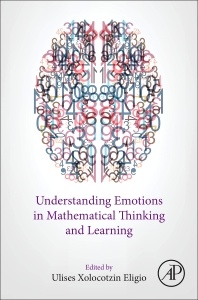L’édition demandée n’est plus disponible, nous vous proposons la dernière édition.
Understanding Emotions in Mathematical Thinking and Learning
Coordonnateur : Xolocotzin Ulises

Emotions play a critical role in mathematical cognition and learning. Understanding Emotions in Mathematical Thinking and Learning offers a multidisciplinary approach to the role of emotions in numerical cognition, mathematics education, learning sciences, and affective sciences. It addresses ways in which emotions relate to cognitive processes involved in learning and doing mathematics, including processing of numerical and physical magnitudes (e.g. time and space), performance in arithmetic and algebra, problem solving and reasoning attitudes, learning technologies, and mathematics achievement. Additionally, it covers social and affective issues such as identity and attitudes toward mathematics.
PART I INTRODUCTION: AN OVERVIEW OF THE FIELD 1. An Overview of the Growth and Trends of Current Research on Emotions and Mathematics 2. Appraising Emotion in Mathematical Knowledge: Reflections on Methodology
PART II COGNITION AND EMOTION IN MATHEMATICAL ACTIVITY 3. Being in Control 4. Epistemic States of Convincement: A Conceptualization from the Practice of Mathematicians and Neurobiology 5. The Impact of Anxiety and Working Memory on Algebraic Reasoning
PART III EMOTIONS IN THE LEARNING AND TEACHNING OF MATHEMATICS PART IIIA LEARNERS IN DIFFERENT EDUCATIONAL LEVELS 6. Students’ Emotional Experiences Learning Mathematics in Canadian Schools 7. "I did Use to Like Maths…": Emotional Changes Towards Mathematics During Secondary School Education 8. When Being Good at Math Is Not Enough: How Students’ Beliefs About the Nature of Mathematics Impact Decisions to Pursue Optional Math Education
PART IIIB LEARNERS WITH MATHEMATICAL DIFFICULTIES 9. Special Needs in Mathematics Classrooms: Relationships with Others 10. The Construct Mathematical Resilience
PART IIIC LEARNERS OUT OF THE SCHOOL 11. The Emotions Experienced While Learning Mathematics at Home 12. Parents’ and Children’s Mathematics Anxiety
PART IIID MATHEMATICS TEACHERS 13. ‘I Hate Maths’: Changing Primary School Teachers’ Relationship with Mathematics 14. Using Students’ Emotional Experiences to Guide Task Design in Mathematics Content Courses
PART IV THEORETICAL ADVANCES 15. Digging Beneath Dual Systems Theory and the Bicameral Brain: Abductions About the Human Psyche from Experience in Mathematical Problem Solving 16. On the Irreducibility of Acting, Emoting, and Thinking: A Societal-Historical Approach to Affect in Mathematical Activity 17. Emotional Orientations and Somatic Markers: Expertise and Decision-Making in the Mathematics Classroom
- Covers methodologies in studying emotion in mathematical knowledge
- Reflects the diverse and innovative nature of the methodological approaches and theoretical frameworks proposed by current investigations of emotions and mathematical cognition
- Includes perspectives from cognitive experimental psychology, neuroscience, and from sociocultural, semiotic, and discursive approaches
- Explores the role of anxiety in mathematical learning
- Synthesizes unifies the work of multiple sub-disciplines in one place
Date de parution : 05-2017
Ouvrage de 474 p.
15x22.8 cm



